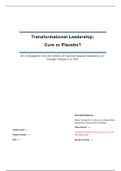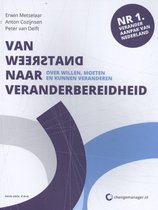Transformational Leadership;
Cure or Placebo?
An investigation into the effects of transformational leadership on
Change Fatigue in a XXX
NCOI Opleidingsgroep
Master Management, Culture and Change (MCC),
specialization Organization Psychology
Thesis Advisor: < >
Student name: < >
Confidential, All Rights Reserved, to be used for
Student number: < > REFERENCE ONLY
Date: < > Number of words: < >
,PREFACE
For over 16 years, I have worked for an international XXX organization with over 27000 employees in
more than 60 countries aXXXss the globe. In my current role, I provide consultative support to the XXX
XXX leadership team to help them achieve business goals.
This thesis was a real journey that could not have been accomplished without the loyalty, patience, and
steadfast support from my family. They cheered me on from the sideline, producing many pots of tea,
and triple expressos, as an expression of their confidence in my ability to complete my degree, even
when I felt exhausted or discouraged.
I would also like to take a moment to thank the study participants for investing their time and their
willingness to share personal experiences and candid views. None of this could have been accomplished
without their help.
A special thank you goes to < > not only for her support and guidance, but especially for encouraging me
to embark on this journey to begin with. Her relentless optimism was sometimes annoying but mostly
infectious and very motivating.
Finally, I’d like to thank my thesis advisor < >, who, by asking the right questions, helped me to think
critically and course-correct where necessary.
It certainly feels like it has been a long journey, but I had great company along the way to keep me
focused and on track. I am indebted to you all. Thank you.
Confidential Page 2 of 33
,ABSTRACT
XXX is a large, internationally operating XXX Organization, offering end-to-end XXX Services. The company was
acquired by an investment company in 2015, resulting in significant pressure on organizational leaders at XXX to
deliver the expected return on investment. To achieve the desired value for the investors, a multi-year
organizational change program is being rolled out, with many of the changes impacting employees in the XXX XXX
(XXX) business unit. To achieve the expected change outcomes, leaders need energized and engaged employees.
However, the annual survey conducted in early 2019 indicated that employees found the pace of change too high.
Results also pointed to a low favorability of the overall quality of leadership.
Given the criticality of the success of the planned organizational changes for the future of XXX, this thesis
investigates the proposed effect of Transformational Leadership behaviors on Change Fatigue with the aim to
provide recommendations for decreasing Change Fatigue, thereby increasing the chance of change adoption and
overall organizational success.
A mixed-method approach was used to conduct this investigation. An online survey was used to investigate the
degree of change fatigue and to what degree leaders exhibit transformational leadership characteristics. This data
allowed for an analysis of the impact of transformational leadership on change fatigue. To supplement the
quantitative data and provide more in-depth insights into how transformational leadership behaviors impact
change fatigue, two focus groups were conducted.
Findings and recommendations
While results confirmed a negative correlation between all Transformational Leadership characteristics and
Change Fatigue, the hypothesis that Transformational Leadership leads to a reduction in Change Fatigue was not
proven. In fact, if practiced in isolation, some transformational leadership behaviors showed the potential to
exacerbate feelings of Change Fatigue. Leaders who encourage staff to meet organizational goals without any kind
of recognition, engagement and acknowledgment, were seen to increase feelings of Change Fatigue. Conversely,
leaders who combine this result orientation with creating a safe space for innovation, challenging assumptions,
and promoting experimentation are more likely to energize employees, thereby mitigating Change Fatigue.
Based on these insights, the following recommendations were made:
1. To inspire, energize, and motivate employees, leaders should define a desirable future state vision and
articulate how organizational objectives are connected to achieving that desirable future.
2. Leaders should promote and foster an innovation-based work environment where employees are encouraged
to participate in problem-solving for more efficient and effective ways of working that will benefit all.
3. Leaders should acknowledge and articulate how individual and group accomplishments contribute towards
achieving the desired future state using examples of achievements and their impacts.
4. The company should establish a leadership bench with the skills to balance the delivery of organizational goals
against employee engagement, acknowledgment, and encouragement. This should include a systemic
approach to hiring, expectation setting, training, measuring, and reinforcing these critical leadership behaviors.
5. As continuous change is expected in years to come and Change Fatigue can impact organizational change
outcomes, the organization should conduct periodic Change Fatigue assessments, augmented by ‘listening
sessions’ where more qualitative inputs can be obtained. This would allow leaders to make data-driven
decisions to course-correct and address issues that may put change embracement and adoption at risk.
Confidential Page 3 of 33
, INHOUD
Preface ...........................................................................................................................................................................2
Abstract .........................................................................................................................................................................3
1. Introduction ...........................................................................................................................................................6
1.1 The evolution of change ..................................................................................................................................6
1.2 Organizational Context ....................................................................................................................................6
1.3 Problem statement ..........................................................................................................................................7
1.4 Research Foundation & Relevance ..................................................................................................................7
1.5 Research Purpose, Question and Scope ..........................................................................................................7
1.6 Reader Guidance .............................................................................................................................................8
2. Literary Research ...................................................................................................................................................8
2.1 Continuous Change ..........................................................................................................................................8
2.2 Change fatigue .................................................................................................................................................9
2.3 Key characteristics of Change Fatigue .............................................................................................................9
2.4 Leadership .....................................................................................................................................................10
2.5 Transformational Leadership key characteristics ..........................................................................................12
2.6 Conceptual model ..........................................................................................................................................12
3. Research Design .......................................................................................................................................................13
3.1 Context and Respondents ..............................................................................................................................13
3.2 Method and Instruments ...............................................................................................................................13
3.3 Procedures .....................................................................................................................................................14
3.4 Data Processing and Analysis.........................................................................................................................15
4. Results .................................................................................................................................................................15
4.1 Responses ......................................................................................................................................................16
4.2 Change Fatigue Results ..................................................................................................................................16
4.3 Transformational leadership Results .............................................................................................................16
4.4 The impact of Transformational Leadership on Change Fatigue ...................................................................17
Confidential Page 4 of 33





